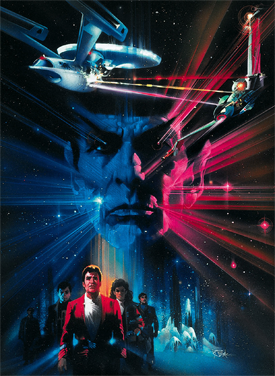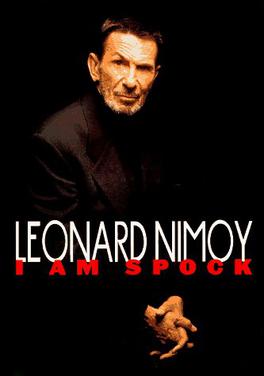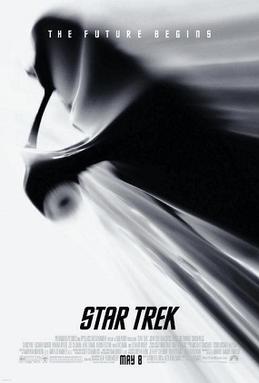Star Trek is an American science fiction television series created by Gene Roddenberry that follows the adventures of the starship USS Enterprise (NCC-1701) and its crew. It acquired the retronym of Star Trek: The Original Series to distinguish the show within the media franchise that it began.

Star Trek: The Animated Series (TAS) is an American animated science fiction television series created by Gene Roddenberry. It originally aired simply under the title Star Trek, subtitled Created by Gene Roddenberry, on Saturday mornings from September 8, 1973 to October 12, 1974 on NBC, spanning 22 episodes over two seasons. The second series in the Star Trek franchise, it features mostly the same characters as Star Trek: The Original Series. Set in the 23rd century, the series follows the further adventures of the Starship USS Enterprise as it explores the galaxy.

Leonard Simon Nimoy was an American actor and director, famed for playing Spock in the Star Trek franchise for almost 50 years. This includes originating Spock in the original Star Trek series in 1966, then Star Trek: The Animated Series, the first six Star Trek films, Star Trek: The Next Generation, the 2009 Star Trek film, and Star Trek Into Darkness. Nimoy also directed films, including Star Trek III: The Search for Spock (1984), Star Trek IV: The Voyage Home (1986), and Three Men and a Baby (1987), and his career included roles in music videos and video games. In addition to acting and filmmaking, Nimoy was a photographer, author, singer, and songwriter.

Spock is a fictional character in the Star Trek media franchise. He first appeared in the original Star Trek series serving aboard the starship USS Enterprise as science officer and first officer and later as commanding officer of the vessel. Spock's mixed human–Vulcan heritage serves as an important plot element in many of the character's appearances. Along with Captain James T. Kirk and Dr. Leonard "Bones" McCoy, he is one of the three central characters in the original Star Trek series and its films. After retiring from active duty in Starfleet, Spock served as a Federation ambassador, and later became involved in the ill-fated attempt to save Romulus from a supernova, leading him to live out the rest of his life in a parallel universe.

Star Trek IV: The Voyage Home is a 1986 American science fiction film, the fourth installment in the Star Trek film franchise based on the television series Star Trek. The second film directed by Leonard Nimoy, it completes the story arc begun in Star Trek II: The Wrath of Khan (1982), and continued in Star Trek III: The Search for Spock (1984). Intent on returning home to Earth to face consequences for their actions in the previous film, the crew of the USS Enterprise finds the planet in grave danger from an alien probe attempting to contact now-extinct humpback whales. The crew travel to Earth's past to find whales who can answer the probe's call.

Brent Jay Spiner is an American actor best known for his role as the android Data on the television series Star Trek: The Next Generation (1987–1994), four subsequent films (1994–2002), and Star Trek: Picard (2020–2023). In 1997, he won the Saturn Award for Best Supporting Actor for his portrayal of Data in Star Trek: First Contact, and was nominated in the same category for portraying Dr. Brackish Okun in Independence Day, a role he reprised in Independence Day: Resurgence. Spiner has also enjoyed a career in the theater and as a musician. He is also known for voicing The Joker in the animated series Young Justice (2011–2022).

Star Trek III: The Search for Spock is a 1984 American science fiction film, written and produced by Harve Bennett, directed by Leonard Nimoy, and based on the television series Star Trek. It is the third film in the Star Trek franchise and is the second part of a three-film story arc that begins with Star Trek II: The Wrath of Khan (1982) and concludes with Star Trek IV: The Voyage Home (1986). After the death of Spock (Nimoy), the crew of the USS Enterprise return to Earth. When James T. Kirk learns that Spock's spirit, or katra, is held in the mind of Dr. Leonard "Bones" McCoy, Kirk and company steal the decommissioned USS Enterprise to return Spock's body to his homeworld. The crew must also contend with hostile Klingons, led by Kruge, who are bent on stealing the secrets of the powerful terraforming device, Genesis.

Christine Chapel is a fictional character who appears in all three seasons of the American science fiction television series Star Trek: The Original Series, as well as Star Trek: The Animated Series and the films Star Trek: The Motion Picture and Star Trek IV: The Voyage Home. Portrayed by Majel Barrett, she was the ship's nurse on board the Starfleet starship USS Enterprise. A younger version of Chapel appears in the 2022 series Star Trek: Strange New Worlds, portrayed by Jess Bush.

"Unification" is a two-part episode of the syndicated American science fiction television series Star Trek: The Next Generation which features Leonard Nimoy as Spock. The first of the two episodes earned a 15.4 household Nielsen rating, drawing over 25 million viewers, making it one of the most watched episodes in all seven seasons of The Next Generation's run.

The Vulcan salute is a hand gesture popularized by the 1960s television series Star Trek. It consists of a raised hand with the palm forward and the thumb extended, while the fingers are parted between the middle and ring finger. The gesture was devised by Star Trek actor Leonard Nimoy as a salute for the alien Vulcan species, and is popular within the Science fiction fandom and nerd culture. The blessing phrase "live long and prosper" is frequently spoken alongside it.

I Am Spock is the second volume of actor and director Leonard Nimoy's autobiography. The book was published in 1995, four years after the release of the last Star Trek motion picture starring the entire original cast, and covers the majority of Nimoy's time with Star Trek in general and Mr. Spock in particular. The book's title was a reference to the first volume of his autobiography, I Am Not Spock, which had been published in 1975. At that time, Nimoy had sought to distance his own personality from that of the character of Spock, although he nonetheless remained proud of his time on the show. Negative fan reaction to the title gave Nimoy the idea for the title of the second volume.

Star Trek is a 2009 American science fiction action film directed by J. J. Abrams and written by Roberto Orci and Alex Kurtzman. It is the 11th film in the Star Trek franchise, and is also a reboot that features the main characters of the original Star Trek television series portrayed by a new cast, as the first in the rebooted film series. The film follows James T. Kirk and Spock aboard the USS Enterprise as they combat Nero, a Romulan from their future who threatens the United Federation of Planets. The story takes place in an alternate reality that features both an alternate birth location for James T. Kirk and further alterations in history stemming from the time travel of both Nero and the original series Spock. The alternate reality was created in an attempt to free the film and the franchise from established continuity constraints while simultaneously preserving original story elements.
Star Trek: Beyond the Final Frontier is a 2-hour 2007 television documentary about the 40-year history of Star Trek and an auction of Star Trek props released by Paramount Pictures for an auction by Christie's auction house in New York City. The documentary aired in the United States on February 19, 2007, and March 3, 2007, on the History Channel.

A Trekkie or Trekker is a fan of the Star Trek franchise, or of specific television series or films within that franchise. The show developed a dedicated and enthusiastic following shortly after it premiered, with the first fanzine premiering in 1967. The first fan convention took place the year the original series ended.

The first season of the American science-fiction television series Star Trek, originally created by Gene Roddenberry, premiered on NBC on September 8, 1966, and concluded on April 13, 1967. The season debuted in Canada on CTV two days before the US premiere, on September 6, 1966. It consisted of 29 episodes, which is the highest number of episodes in a season for the original series of Star Trek. It features William Shatner as Captain James T. Kirk, Leonard Nimoy as Spock, and DeForest Kelley as Leonard McCoy.
Alien Voices was a project set up by John de Lancie and Leonard Nimoy which specialized in audiobooks of science fiction novels in the style of radio plays. The productions were distributed by Simon & Schuster Audio, but the project was shut down following pressure from the distributor for greater sales and the dissatisfaction of de Lancie and Nimoy at this direction. The productions featured a number of cast members from the various Star Trek series. Digital editions of the plays were released in 2012.

Mind Meld: Secrets Behind the Voyage of a Lifetime is a 2001 American documentary film in which actors William Shatner and Leonard Nimoy discuss the Star Trek science fiction franchise and its effects on their lives. Shatner and Nimoy portrayed the characters James T. Kirk and Spock respectively in the 1960s Star Trek television series, the 1970s animated television series, and their film sequels.

For the Love of Spock is a 2016 American documentary film about actor Leonard Nimoy produced by 455 Films and directed by his son Adam Nimoy, who started it before his father's death, at the age of 83, on February 27, 2015.

The development of Spock, a fictional character first introduced in the American science fiction television series Star Trek, began prior to the start of the series. The first known mention of Spock was in a discussion between Gene Roddenberry and Gary Lockwood, where the latter suggested Leonard Nimoy for the role. Roddenberry agreed with the suggestion, and Nimoy became the first choice actor for the part. However, Roddenberry was required to audition other actors for the role. It was offered to both DeForest Kelley and Martin Landau before Nimoy. Nimoy disliked the prosthetic ears he was required to wear, and there were concerns from the studio that they made him appear satanic. Roddenberry fought to keep the character in the second pilot, "Where No Man Has Gone Before" after the rest of the main cast was dropped from the initial pilot, "The Cage".
















